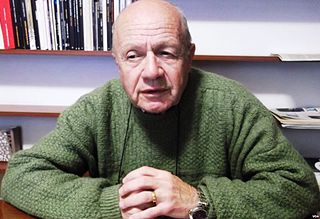
Kurds or Kurdish people are an Iranian ethnic group native to the mountainous region of Kurdistan in Western Asia, which spans southeastern Turkey, northwestern Iran, northern Iraq, and northern Syria. There are exclaves of Kurds in Central Anatolia, Khorasan, and the Caucasus, as well as significant Kurdish diaspora communities in the cities of western Turkey and Western Europe. The Kurdish population is estimated to be between 30 and 45 million.

Kurdish is a language or a group of languages spoken by Kurds in the geo-cultural region of Kurdistan and the Kurdish diaspora. Kurdish languages constitutes a dialect continuum, many of which are not mutually intelligible, belonging to Western Iranian languages in the Indo-European language family. The main three dialects or languages of Kurdish are Northern Kurdish, Central Kurdish, and Southern Kurdish.

The Patriotic Union of Kurdistan is a political party active in Kurdistan Region and the disputed territories in Iraq. The PUK describes its goals as self-determination, human rights, democracy and peace for the Kurdish people of Kurdistan and Iraq. The PUK is currently under the leadership of Bafel Talabani. The PUK was founded in 1975 by Jalal Talabani, Nawshirwan Mustafa, Fuad Masum, Adel Murad, Ali Askari and Abdul Razaq Feyli. All presidents of Iraq under the 2005 constitution have been from this party.

Kurdistan, or Greater Kurdistan, is a roughly defined geo-cultural region in the Middle East wherein the Kurds form a prominent majority population and the Kurdish culture, languages, and national identity have historically been based. Geographically, Kurdistan roughly encompasses the northwestern Zagros and the eastern Taurus mountain ranges.

The Kurds are an Iranian ethnic group in the Middle East. They have historically inhabited the mountainous areas to the south of Lake Van and Lake Urmia, a geographical area collectively referred to as Kurdistan. Most Kurds speak Northern Kurdish Kurmanji Kurdish (Kurmanji) and Central Kurdish (Sorani).

Jalal Talabani was an Iraqi politician who served as the sixth president of Iraq from 2005 to 2014, as well as the president of the Governing Council of Iraq. He was the first non-Arab president of Iraq.

Newroz or Nawroz is the Kurdish celebration of Nowruz; the arrival of spring and new year in Kurdish culture. The lighting of the fires at the beginning of the evening of March 20 is the main symbol of Newroz among the Kurds.
Kurds in Iran constitute a large minority in the country with a population of around 9 and 10 million people.

Turkish Kurdistan or Northern Kurdistan refers to the southeastern part of Turkey where Kurds form the predominant ethnic group. The Kurdish Institute of Paris estimates that there are 20 million Kurds living in Turkey, the majority of them in the southeast.

The Kurds are the largest ethnic minority in Turkey. According to various estimates, they compose between 15% and 20% of the population of Turkey. There are Kurds living in various provinces of Turkey, but they are primarily concentrated in the east and southeast of the country within the region viewed by Kurds as Turkish Kurdistan.

İsmail Beşikçi is a Turkish sociologist, philosopher, revolutionist, and writer. He is a PEN Honorary Member. He has served 17 years in prison on propaganda charges stemming from his writings about the Kurdish population in Middle East.

Armenian–Kurdish relations covers the historical relations between the Kurds and the Armenians.
Kurdish nationalist uprisings have periodically occurred in Turkey, beginning with the Turkish War of Independence and the consequent transition from the Ottoman Empire to the modern Turkish state and continuing to the present day with the current PKK–Turkey conflict.

Kurds in the United States refers to people born in or residing in the United States of Kurdish origin or those considered to be ethnic Kurds.

Scholars have suggested different theories for the origin of the name Kurd. According to the 19th century English Orientalist Godfrey Rolles Driver, the term Kurd is related to the Sumerian Karda which was found from Sumerian clay tablets of the third millennium B.C, while according to other scholars, it predates the Islamic period, as a Middle Persian word for "nomad", and may ultimately be derived from an ancient toponym or tribal name, either that of the Cyrtii or of Corduene, and mainstream academic opinion favours the Kurds being descended from Corduene.

The main religions that exist or historically existed in Kurdistan are as follows: Sunni Islam, Shia Islam, Christianity, Zoroastrianism, Yarsanism, Yazidism, Alevism and Judaism. Overall today, Sunni Islam is the most adhered to religion in Kurdistan.

Najmiddin Karim, also known as Najmaldin Karim, was an Iraqi Kurdish politician who was governor of Kirkuk Governorate from 2011 to 2017. Prior to the invasion of Iraq, Karim had served in numerous Kurdish and Iraqi opposition groups.
The Kurdish Studies Network (KSN) is "a global research network" for scholars working within the field of Kurdish studies. It was established in 2009 by Welat Zeydanlıoğlu, a Kurdish researcher and academic based in Sweden.

Syrian Kurdistan is a region in northern Syria where Kurds form the majority. It is surrounding three noncontiguous enclaves along the Turkish and Iraqi borders: Afrin in the northwest, Kobani in the north, and Jazira in the northeast. Syrian Kurdistan is often called Western Kurdistan or Rojava, one of the four "Lesser Kurdistans" that comprise "Greater Kurdistan", alongside Iranian Kurdistan, Turkish Kurdistan, and Iraqi Kurdistan.

The Azadî, officially Civata Azadiya Kurd, later Civata Xweseriya Kurd was a Kurdish secret organization. According to Kurds who reported to British intelligence officers, Azadî was established in Erzurum in 1921 by Halid Beg Cibran. The aim of Azadî was to deliver the Kurds a life in freedom in a developed environment.










